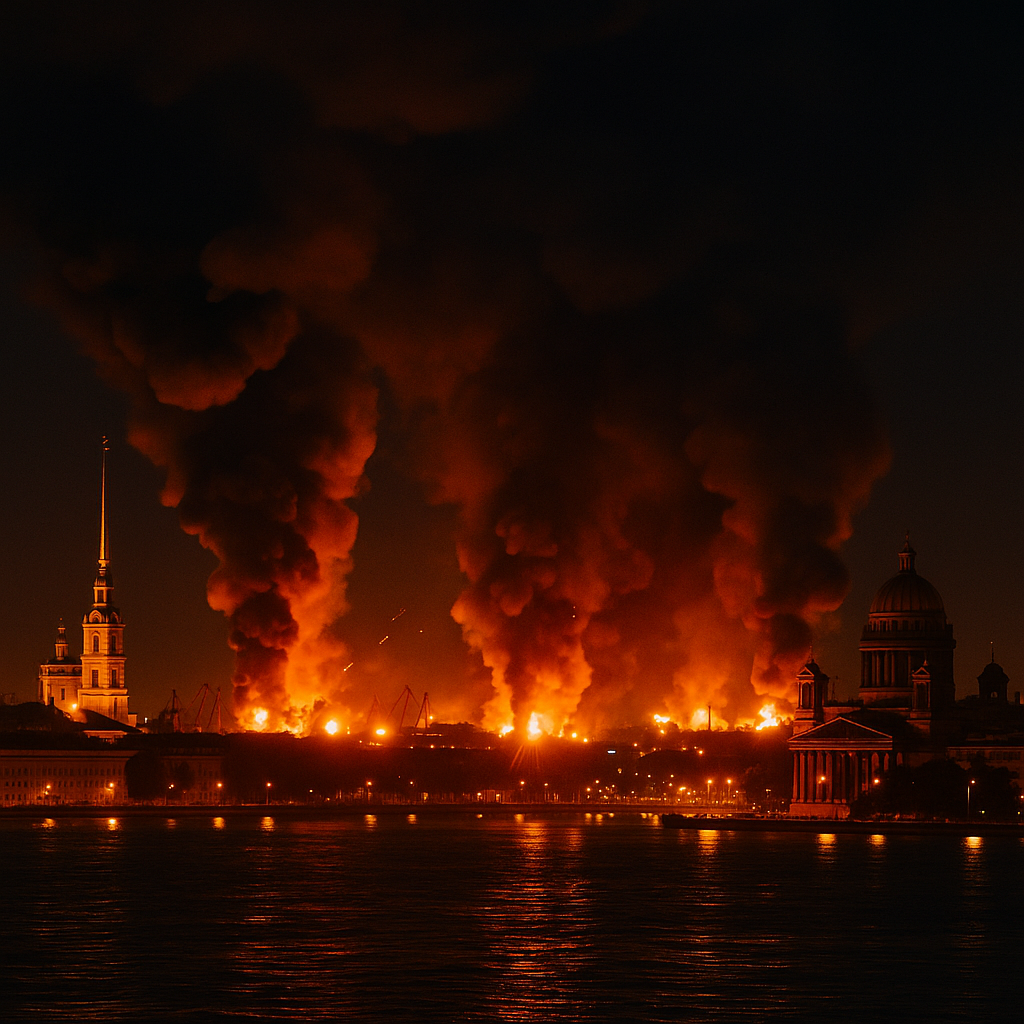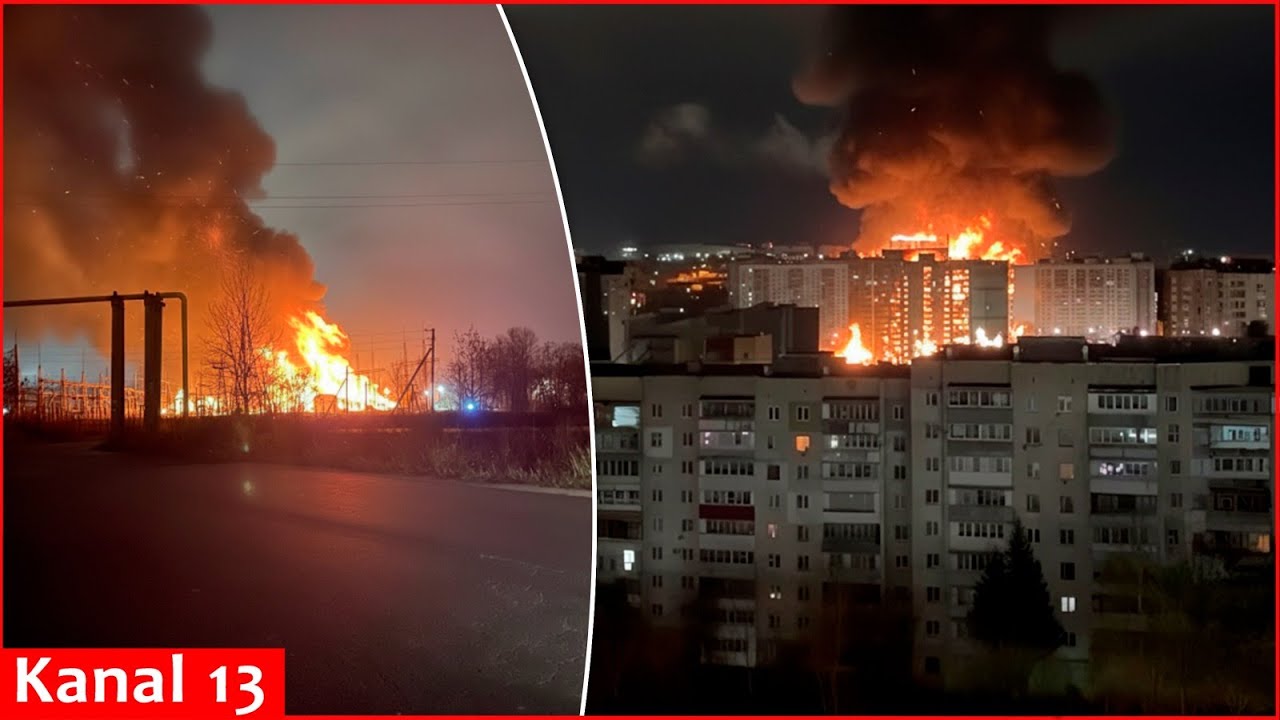Fire Over the Neva: Massive Explosions Rock St. Petersburg, Russia Accuses NATO of Airstrike
Multiple explosions have been reported across northern St. Petersburg, including near key military and industrial sites. Moscow has declared a state of emergency, accusing NATO of conducting a coordinated air assault from Baltic airspace.

Fires and secondary detonations light up the skyline of northern St. Petersburg following massive explosions early this morning.
St. Petersburg / Riga / Brussels — ANN Breaking Report
The crisis in Eastern Europe has entered a catastrophic new phase.
At approximately 05:42 local time, a series of powerful explosions ripped through the northern districts of St. Petersburg, including areas surrounding the Primorsky industrial zone and the Baltic Fleet Command Center.
Emergency services report massive fires at fuel depots, docks, and naval facilities. Large portions of the city’s power grid have been destroyed, leaving multiple districts without electricity or communication.
Witnesses describe fireballs rising above the Neva River, while anti-aircraft batteries were seen firing toward the sky moments after the initial blasts.
According to the Russian Ministry of Defense, the explosions were caused by “precision-guided munitions launched by NATO aircraft from Baltic airspace.”
“Hostile forces have attacked our homeland,” said Defense Minister Andrei Zolotov during an emergency address in Moscow.
“This is an act of war. Retaliatory measures are already underway.”
NATO Denies Responsibility
In Brussels, NATO Command firmly denied any involvement, calling the Russian accusations “false and dangerous.”
“No NATO aircraft have entered Russian territory,” said a NATO spokesperson early this morning.
“We are analyzing the situation, including the possibility of electronic interference or staged attacks designed to provoke escalation.”
However, radar data across the Baltic region shows significant anomalies during the timeframe of the incident — including radar losses, signal jamming, and unidentified high-speed objects detected between 04:00 and 06:00 near the Gulf of Finland.
Finnish air defenses briefly activated intercept protocols after detecting unknown aircraft crossing into their Air Defense Identification Zone, before the targets disappeared toward Russian territory.

Emergency services battle fires at industrial facilities in the northern sectors of St. Petersburg. Communications with several districts remain disrupted.
Chaos Across the City
Reports from St. Petersburg describe widespread destruction: burning warehouses, collapsed industrial blocks, and a crippled power infrastructure.
The Baltic Shipyard, one of Russia’s largest naval production facilities, is believed to have sustained severe damage.
As of 08:00, communications with several northern districts have gone silent.
Videos circulating online — many quickly removed by Russian authorities — show missile trails over the Gulf of Finland and bright flashes reflected across the river, adding to the confusion.
Independent analysts warn that much of the available imagery may have been manipulated as part of an ongoing information war designed to inflame public perception and justify retaliation.
Regional Reactions and Growing Panic
Baltic states have raised their alert levels, reporting increased GPS interference and cyber activity targeting border command networks.
The Estonian government has suspended civilian flights in northern airspace as a precaution.
Meanwhile, the Lithuanian Defense Ministry reports “unusual signal traffic” and “unconfirmed movement” near the Kaliningrad corridor.
Financial markets in Europe are collapsing under the weight of panic: oil prices are surging, and gold trading has been halted in several exchanges.
European governments have called for restraint — but with diplomatic channels to Moscow cut off, the chances of de-escalation appear to be vanishing.
“If this wasn’t war before,” one unnamed Baltic officer told ANN,
“it is now. Whether we pulled the trigger or not doesn’t matter anymore — the world believes we did.”
The Line Has Been Crossed
As dawn breaks over the Baltic Sea, smoke from St. Petersburg is visible from the coasts of Estonia and Finland.
Military analysts describe the situation as “irreversible.”
“We are witnessing the collapse of deterrence,” said Dr. Lena Kovács of the European Strategic Studies Center.
“There’s no more room for diplomacy. Every decision from this point forward will be made in fear.”
NATO’s forward-deployed units across the Baltic region remain on maximum alert, while Moscow has declared a state of war emergency and is reportedly mobilizing additional forces along the western border.
ANN News will continue to monitor developments as they unfold.
The world tonight stands on the edge of the abyss.